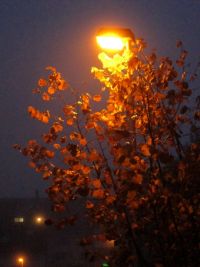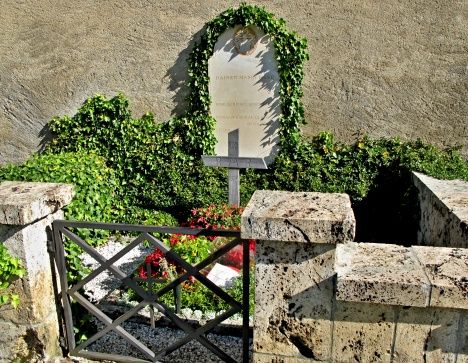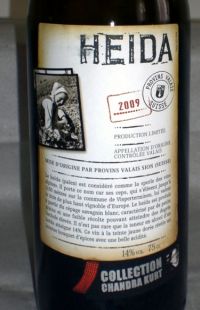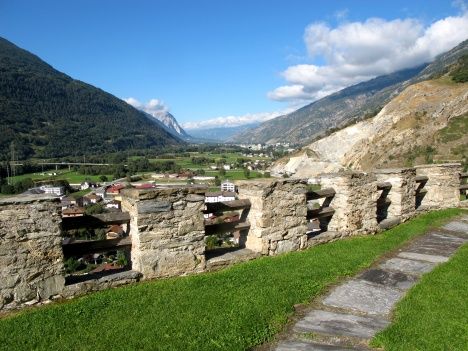
|
| Autumn also preserves its colours at night (Photo: P. Züllig) |
Autumn day
written in 1902 by Rainer Maria Rilke
Lord it is time. The summer was very great.
Lay your shadow on the sundials,
and in the corridors let go the winds.
Command the last fruits to be full;
give them two more southern days,
urge them on to perfection and chase
the last sweetness into the heavy wine.
He who has no house now, builds none for himself.
He who is alone now will remain so for a long time,
will watch, read, write long letters
and will wander restlessly in the avenues
back and forth as the leaves drift.

|
| The grave of Rainer Maria Rilke in Raron (Photo: P. Züllig) |
The image of an autumn day, thoughts about the search for a fulfilled life. That wine also appears here - in only three stanzas - is remarkable. And it is not a rhyme, as is so often found in mocking and drinking songs: wine, sunshine, none, Rhine, being drunk.... It is rather the rhythm, the sound of the language, the variations in the forms, the alliterations, the contemplative thoughts that make the poem topical, even present-day, even after more than a hundred years, and that will probably be retrieved again and again for a long time to come. Especially when it is about maturity, completion and the search for the meaning of life.

|
| Heida wine from the mountain canton of Valais (Photo: P. Züllig) |
Heida wine matches the rhythm and thoughts of Rilke's poem - this is not so far-fetched - with its depth and incredible freshness, with pronounced aromas of citrus reflected in the sweetness, and above all with its persistence and incredibly incisive length.
Perhaps autumn is precisely the time when the pleasure of enjoyment can best marry with poetry. It doesn't have to be Rilke, there are still so many more or less great poets who have granted wine rhymes. Shakespeare, for example, with compelling logic: "He who drinks wine sleeps well. He who drinks wine does not sin. He who does not sin will be blessed. But Shakespeare was a playwright rather than a lyricist. Let's get confirmation for the theme from Schiller: "Drink it up, the drink of the Labe, and forget the great pain! Wonderful is Bacchus' gift, balm For the torn heart!"Or let's devote a moment to the soul of the people (immortalised on a stove tile, author unknown): "The god who begipfelt the mountains, The god who bezipfelt the boys, The god who split the girls, The god may preserve the wine for us".

|
| View from Rilke's gravesite into the Lower Valais (Photo: P. Züllig) |
But let us return to Heida, to Raron, to Rilke's grave, to one of his late works. As with a good wine, there is much to puzzle over. The beauty usually lies in the unspoken. To the poet, the final column should be reserved:
To some it is like wine, which gloriously takes the shine of the glass
into its inner glow,
others breathe it in like the blossom of the grass,
or it fades before them, pursued and frightened away.
To many it renews the secret hearing and enhances
every appeal to it of the clarified nature.
No one reviles her to whom she seems to refuse,
who only experienced the space of her dwelling;
yes only the gate, the arch, the suddenly wreathed,
yes only the path, of whose bend it is said,
that it is the last before the ever-glowing
house, where hearts, watered and fed,
are strong and safe. Where they are what they thought they were,
when they longed for day and yield
and from long, lost or wept
nights struck with terrible blow.
For even those, nothing but longing afford,
only inconspicuously dispersed, the whole reference;
their strong shining hearts circled
worlds of night in consummate prow.
Sincerely
Yours